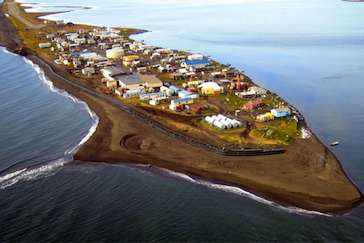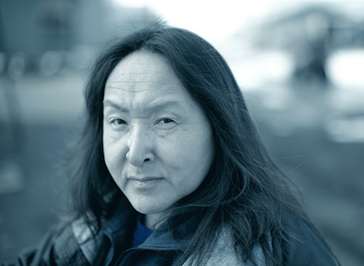
Which is perhaps just as well, because within a decade Kivalina is likely to be under water. Gone, forever. Remembered – if at all – as the birthplace of America’s first climate change refugees.
Four hundred indigenous Inuit people currently live in Kivalina’s collection of single-storey cabins. Their livelihoods depend on hunting and fishing.
In June, the United States Supreme Court denied the Native Village of Kivalina the right to sue Exxon Mobil for the climate damage which has caused them to be endangered by the sea level.
Given the increasing number of expensive disasters, as well as the costs imposed by long-term sea level rise, there will be many more private claims like this filed, but Kivalena was the first.
Alaska’s role in the climate story is about cause as well as effect. As America’s Arctic territory warms it continues to be a vital source of the carbon-based fossil fuels seen by most scientists as a key driver of climate change.
Within a generation the Arctic ocean may be ice free during the summer. The rate of warming in the far north is unmatched anywhere else on the planet.

Alaska’s North Slope is the US’s biggest oil field and the Trans Alaska pipeline is a key feature of America’s drive for energy security. As production from the existing field tails off there is enormous pressure to tap untouched Alaskan reserves.
Shell has launched an ambitious bid to begin offshore Arctic drilling despite a chorus of disapproval from environmental groups. Concerns intensified when a rig ran aground off the Alaskan coast at the beginning of this year. Operations are currently suspended, but the prize is too valuable to ignore.
Kate Moriarty, executive director of the Alaska Oil and Gas Federation, believes Alaska possesses 50 billion as-yet untapped barrels of oil.
“The reality is the Arctic is going to be developed,” she says. “And who do we want in the lead? I say we want it to be the United States because the reality is the world demand for oil and gas is not going to go away.”
The sea has sustained the people of Kivalina for countless generations but in the last two decades the dramatic retreat of the Arctic ice has left them desperately vulnerable to coastal erosion. No longer does thick ice protect their shoreline from the destructive power of autumn and winter storms. Kivalina’s spit of sand has been dramatically narrowed.
The US Army Corps of Engineers built a defensive wall along the beach in 2008, but it was never more than a stop-gap measure.
If we’re still here in 10 years time we either wait for the flood and die, or just walk away and go someplace else” said Colleen Swan, Kivalina council leader.
A ferocious storm two years ago forced residents into an emergency evacuation. Now the engineers predict Kivalina will be uninhabitable by 2025.
Kivalina’s story is not unique. Temperature records show the Arctic region of Alaska is warming twice as fast as the rest of the United States.
Retreating ice, slowly rising sea levels and increased coastal erosion have left three Inuit settlements facing imminent destruction, and at least eight more at serious risk.
The problem comes with a significant price tag. The US Government believes it could cost up to $400m (£265m) to relocate Kivalina’s inhabitants to higher ground – building a road, houses, and a school does not come cheap in such an inaccessible place. And there is no sign the money will be forthcoming from public funds.
Kivalina council leader, Colleen Swan, says Alaska’s indigenous tribes are paying the price for a problem they did nothing to create.
“The US government imposed this Western lifestyle on us, gave us their burdens and now they expect us to pick everything up and move it ourselves. What kind of government does that?”
North of Kivalina there are no roads, just the vast expanse of Alaska’s Arctic tundra. And at the most northerly tip of US territory lies the town of Barrow – much closer to the North Pole than to Washington DC. America’s very own climate change frontline.
Barrow’s residents are predominantly from the Inupiat tribe – they hunt bowhead whale and seal. But this year has been fraught with problems.
The sea ice started to melt and break up as early as March. Then it refroze, but it was so thin and unstable the whale and seal hunters were unable to pull their boats across it. Their hunting season was ruined.
“The reality is the Arctic is going to be developed” said Kate Moriarty, of Alaska Oil and Gas Federation. “We have to adapt to what’s coming, if we’re gonna keep eating and surviving off the sea, but no whale this year means it will be a long cold winter,” he says.
And when it comes to balancing two conflicting pressures – a rapidly changing climate on the one hand, the demand to expand the state’s carbon-fuelled economy on the other – there is little doubt where the priority lies.
The deputy commissioner of Alaska’s Department of Natural Resources, Ed Fogels, makes no apology for Alaska’s strategy. “When everyone pounces on Alaska and says ‘oh, the climate is changing, the Arctic is changing, things are out of control’, we say wait a minute. We’ve been developing our natural resources for 50 years now. Things are going quite well thank you.”
powkey Portable Power Station 350W, 260Wh/70,000mAh Backup Lithium Battery, 110V Pure Sine Wave Power Bank with 2 AC Outlets, Portable Generator for Outdoors Camping Travel Hunting Emergency
Now retrieving the rating.
$192.98 (as of April 24, 2024 13:58 GMT +01:00 - More infoProduct prices and availability are accurate as of the date/time indicated and are subject to change. Any price and availability information displayed on [relevant Amazon Site(s), as applicable] at the time of purchase will apply to the purchase of this product.)Amazon Visa
Now retrieving the rating.
$23.00 (as of April 24, 2024 13:58 GMT +01:00 - More infoProduct prices and availability are accurate as of the date/time indicated and are subject to change. Any price and availability information displayed on [relevant Amazon Site(s), as applicable] at the time of purchase will apply to the purchase of this product.)200W Portable Power Station, Powkey 120Wh/33,000mAh Power Bank with AC Outlet, 110V 6 Outputs Solar Generator External Battery Pack with LED Light for Home Use and Outdoor Camping
Now retrieving the rating.
31% OffAnker Power Bank Power Station 60,000mAh,Portable Outdoor Generator 87W with Smart Digital Display, Retractable Auto Lighting and SOS Mode, Home Backup(PowerCore Reserve 192Wh) for Travel, Camping
Now retrieving the rating.
$149.99 (as of April 24, 2024 13:58 GMT +01:00 - More infoProduct prices and availability are accurate as of the date/time indicated and are subject to change. Any price and availability information displayed on [relevant Amazon Site(s), as applicable] at the time of purchase will apply to the purchase of this product.)Foldable Solar Panel Charger 60W with 18V DC Output (11 Connectors) for 100W~350W Portable Power Stations Jackery/Rockpals/Flashfish/Enginstar, Portable Solar Generator for Outdoor Camping Van RV Trip
Now retrieving the rating.
$98.99 (as of April 24, 2024 13:58 GMT +01:00 - More infoProduct prices and availability are accurate as of the date/time indicated and are subject to change. Any price and availability information displayed on [relevant Amazon Site(s), as applicable] at the time of purchase will apply to the purchase of this product.)





2 Responses
Living about 1 mm above sea level in a very seismically active part of the world is more likely to be the demise of this town than anything else. A tsunami could wipe it out or it could slide into the sea like the famous 1964 Alaskan earthquake.
The people who love oil certainly do not care a bit about others or consequences. It’s a rat race to get rich, or richer. It doesn’t matter if people die because of it. Greed is defined the same in all people who embrace it.
Oil and gas need to go away completely. We have been cheated for 100 years. Technology has always been here to transport ourselves without gas. By horse. The all-electric car that a man died for. What about the two feet you have?
I am amazed that society hasn’t already been destroyed, although its on its way thanks to greed. The only ones who will survive are the ones who are off-grid and expected it all to happen. I will be one of those people thank you.